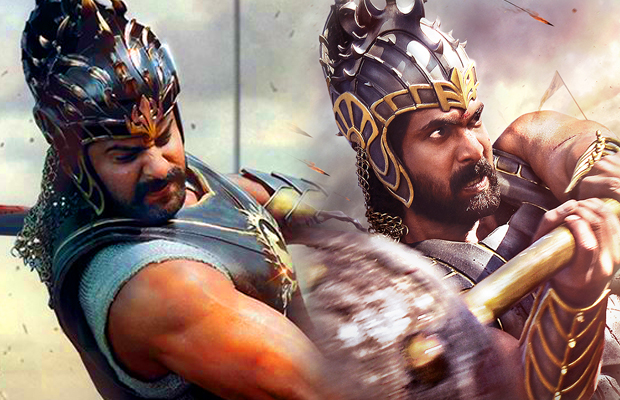In the 1940s, a Tamil studio attempted a pan-Indian epic that cost over Rs 3 million and told the story of two royal siblings warring over the kingdom and a woman. The film was Chandralekha and it had a scale that till then had been seen only in Hollywood films. The famous drum scene has been attempted many times subsequently but has never been bettered. Historical narratives and swashbuckling set-pieces were also attempted by the likes of Sohrab Modi, Mehboob Khan, K Asif and Kamaal Amrohi and in the 70s, even Manmahon Desai tried a quasi-epic with the hilarious Dharam Veer. So yes, grandeur is not new to us and neither are films with sinewy heroes brandishing their swords in our faces. But what sets Baahubali-The Beginning apart is its audaciously ambitious desire to compete with global standards of lavish film-making with an unapologetically Indian content. It revels in the tapestry of an India that our most loved epics have woven for us.
The India that Amar Chitra Katha comics presented in easily digestible bites. An India of our wildest imaginings, of sand-coloured fortresses, warriors who could leap across canyons, men and women with unassailable moral courage who lived and died for an unfathomable code of honour. An India where clouds of butterflies, dense green forests, mountainous waterfalls and battle fields infested with locust swarms, cascading arrows and chariots of fire co-existed. The visual grandeur of this SS Rajamouli film is as expansive as the human imagination but what makes it all come together is the director’s unerringly skilled story-telling.
The way visual and verbal punchlines segue. As when Bhallala Deva, the evil king is orchestrating the installation of his statue in the heart of his kingdom and it begins to topple over till a mysterious stranger reaches out and steadies the struggling human chain and a startled cry of ‘Baahubali’ escapes one person and then reaches another till the skies begin to reverberate with the forbidden chant. Or the battle scenes where Rana Daggubati’s Bhallala Deva and Prabhas as Amarendra Baahubali are trying to outwit an im possibly evil nemesis. And the subtext in places. When you can’t fight the river, let it fight for you.
So a queen (Ramya) lets swirling waves take her and a royal heir away from danger, her defiant arm holding the baby above the waters even though she can’t hold her head up any more. Or Anushka Shetty’s Devasena, chained to a pillar in the town square, picking up twigs to create a pyre for her foe. Or Sathyaraj’s Kattappa, primed to kill a stranger, sliding on his knees instead in veneration when he recognises who the man before him, really is. Or Shivudu (Prabhas again) who must climb a mountain because it is calling out to him.
Prabhas has a presence that goes beyond his obvious movie star charm. He can be playful, self-effacing and fiercely all consuming when he is sharing screen space with other actors. He plays the titular role with ease, swagger, humility, warmth and wit and is hugely likable. Rana Daggubati is imposing as the antagonist. Ramya Krishnan is imperious with her compelling eyes and commanding voice. Nasser enjoys the cartoonish flamboyance of his character. Not to forget Sudeep in a cameo.
Tamannaah veers between a damsel who must be disrobed by a man to fall in love with him and a woman on a deadly mission. Yes, so that one rankles a bit. The fact that in this extravaganza driven by testosterone, sweat, blood and gore, even women with swords and smarts must play secondary roles. They must be rescued or controlled or seduced. And despite being capable enough, they never really fill manly positions and only guard them for worthy male heirs. And the awkward fact that a rogue army is painted black to emphasise just how evil it is. And the item girls undulating around Prabhas. The songs are a bit intrusive but the background score by M. M. Keeravani is stirring. Sabu Cyril’s production design is at best when it is not replaying fantasy sequences from umpteen films. V. Srinivas Mohan supervises some of the best visual effects ever seen. Is it worth the price of a ticket? Yes, many times over. An early morning show was packed to the rafters and recalled the frenzy films like Mughal–E-Azam once evoked. Just for the energy this cinematic experience has unleashed among jaded viewers, go and watch it. And then go back for the conclusion in 2016. Quibbles apart (CGI- induced cruelty to animals, included), be proud India, your first bona fide global hit is here.
 with The New Indian Express Reema Moudgil works for The New Indian Express, Bangalore, is the author of Perfect Eight, the editor of Chicken Soup for the Soul-Indian Women, an artist, a former RJ and a mother. She dreams of a cottage of her own that opens to a garden and where she can write more books, paint, listen to music and just be silent with her cats.
with The New Indian Express Reema Moudgil works for The New Indian Express, Bangalore, is the author of Perfect Eight, the editor of Chicken Soup for the Soul-Indian Women, an artist, a former RJ and a mother. She dreams of a cottage of her own that opens to a garden and where she can write more books, paint, listen to music and just be silent with her cats.






